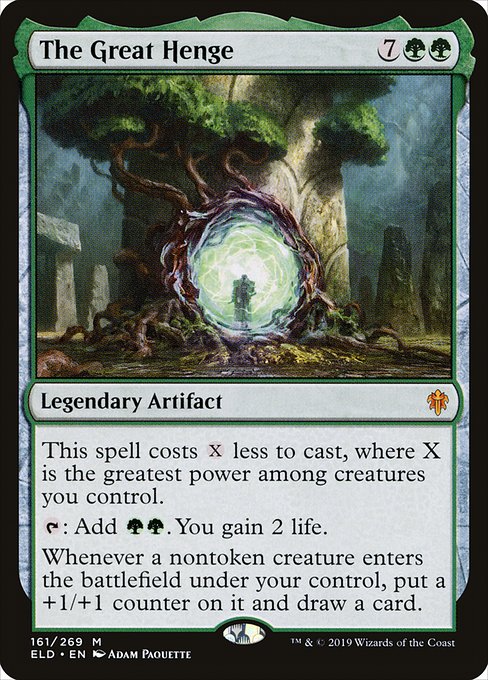O Grande Círculo
Artefato Lendário
Esta mágica custa a menos para ser conjurada, sendo X o maior poder entre os das criaturas que você controla.
: Adicione . Você ganha 2 pontos de vida.
Toda vez que uma criatura não ficha entrar no campo de batalha sob seu controle, coloque um marcador +1/+1 nela e compre um card.
: Adicione . Você ganha 2 pontos de vida.
Toda vez que uma criatura não ficha entrar no campo de batalha sob seu controle, coloque um marcador +1/+1 nela e compre um card.
standard
future
historic
gladiator
pioneer
modern
legacy
pauper
vintage
penny
commander
brawl
alchemy
paupercommander
duel
oldschool
premodern
Rulings
Once The Great Henge's last ability has triggered, you'll draw a card even if you can't put a +1/+1 counter on the creature for some reason (most likely because it has left the battlefield).
Once you announce that you're casting a spell, no player may take actions until the spell has been paid for. Notably, opponents can't try to change by how much a relic's cost is reduced.
The first step of casting a spell is to move it to the stack. If this causes the greatest power among creatures you control to change, that new power will be used to determine the cost reduction.
The cost reduction ability reduces only the generic mana in the relic's cost. The colored mana must still be paid.
To determine the total cost of a spell, start with the mana cost or alternative cost you're paying, add any cost increases, then apply any cost reductions. The mana value of the spell remains unchanged, no matter what the total cost to cast it was.
Once you determine the cost to cast The Great Henge, you may activate mana abilities to pay that cost. If the greatest power among creatures you control changes while activating mana abilities, the cost to cast The Great Henge remains what you previously determined.
Once you announce that you're casting a spell, no player may take actions until the spell has been paid for. Notably, opponents can't try to change by how much a relic's cost is reduced.
The first step of casting a spell is to move it to the stack. If this causes the greatest power among creatures you control to change, that new power will be used to determine the cost reduction.
The cost reduction ability reduces only the generic mana in the relic's cost. The colored mana must still be paid.
To determine the total cost of a spell, start with the mana cost or alternative cost you're paying, add any cost increases, then apply any cost reductions. The mana value of the spell remains unchanged, no matter what the total cost to cast it was.
Once you determine the cost to cast The Great Henge, you may activate mana abilities to pay that cost. If the greatest power among creatures you control changes while activating mana abilities, the cost to cast The Great Henge remains what you previously determined.
Rulings
Once The Great Henge's last ability has triggered, you'll draw a card even if you can't put a +1/+1 counter on the creature for some reason (most likely because it has left the battlefield).
Once you announce that you're casting a spell, no player may take actions until the spell has been paid for. Notably, opponents can't try to change by how much a relic's cost is reduced.
The first step of casting a spell is to move it to the stack. If this causes the greatest power among creatures you control to change, that new power will be used to determine the cost reduction.
The cost reduction ability reduces only the generic mana in the relic's cost. The colored mana must still be paid.
To determine the total cost of a spell, start with the mana cost or alternative cost you're paying, add any cost increases, then apply any cost reductions. The mana value of the spell remains unchanged, no matter what the total cost to cast it was.
Once you determine the cost to cast The Great Henge, you may activate mana abilities to pay that cost. If the greatest power among creatures you control changes while activating mana abilities, the cost to cast The Great Henge remains what you previously determined.
Once you announce that you're casting a spell, no player may take actions until the spell has been paid for. Notably, opponents can't try to change by how much a relic's cost is reduced.
The first step of casting a spell is to move it to the stack. If this causes the greatest power among creatures you control to change, that new power will be used to determine the cost reduction.
The cost reduction ability reduces only the generic mana in the relic's cost. The colored mana must still be paid.
To determine the total cost of a spell, start with the mana cost or alternative cost you're paying, add any cost increases, then apply any cost reductions. The mana value of the spell remains unchanged, no matter what the total cost to cast it was.
Once you determine the cost to cast The Great Henge, you may activate mana abilities to pay that cost. If the greatest power among creatures you control changes while activating mana abilities, the cost to cast The Great Henge remains what you previously determined.
Votre collection ? vos decks ?
Envie de gérer votre collection et/ou créer des decks ?

